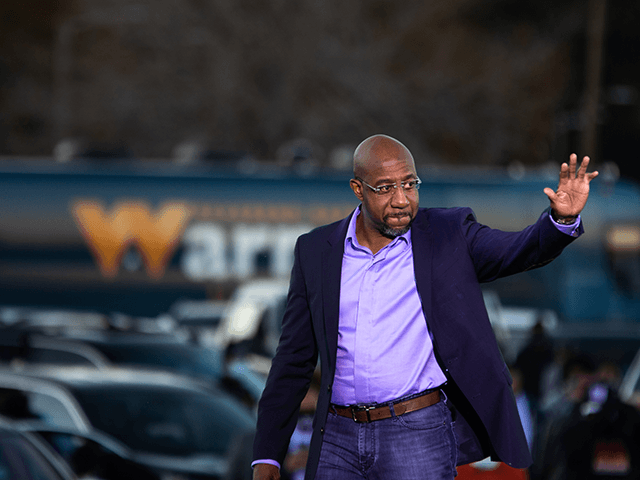The Chicago Tribune, a newspaper in one of the nation’s most liberal cities, is weighing in on the U.S. Senate runoffs in Georgia, claiming in an editorial on Monday that diversity in the state’s suburban neighborhoods could spell victory for Democrat candidates Raphael Warnock and Jon Ossoff.
The two Democrats are running against GOP Sens. Kelly Loeffler and David Perdue in Tuesday’s election that will determine control of the U.S. Senate.
The Tribune editorial board wrote that Warnock’s “viral” ads against Loeffler include him walking his dog in one of those suburban neighborhoods:
The ads by Warnock, a black pastor running to be the first Black senator in a state with one of the largest black populations in the country, appeared to be a calculated attempt to neutralize racial attacks against him and a clear illustration of the changing demographics of the state, political observers and experts said.
Seven of the 10 counties in the country with the fastest-growing Black populations are near Atlanta, according to a Pew Research Center analysis of 2018 census population data. And several populous counties in the state, such as Gwinnett and Cobb, flipped to Democrats in 2016 and again in 2020 with larger margins. Democratic support has also increased in other suburban counties since 2016. It’s partly those demographic shifts, including a massive grassroots get-out-the-vote infrastructure built over years by Black activists, that delivered the state to a Democratic presidential candidate for the first time since 1992 — and they may give Democrats a boost in Tuesday’s twin runoffs. Besides Loeffler and Warnock, Democrat Jon Ossoff is also taking on Republican David Perdue, whose term expired on Sunday.
Experts attributed the shift largely to what they described as reverse migration, in which many Black families who resettled in Northern cities to start over again during the Great Migration from 1916 to 1970 have returned to the South. The influx of new residents over decades, which includes growing Asian American and Latino populations, has changed the racial makeup of states in the South like Georgia and Atlanta’s suburbs in particular. They are mixed economically, encompassing working-class people and high-income professionals.
The newspaper’s editorial also quoted experts saying recent demographic shifts in Georgia are profound.
“It’s because that is black Georgia now — it is a suburban Georgia. It’s not nearly as rural anymore, and it’s not as much inner city,” Matthew Hauer, a professor of sociology at Florida State University, who was head of the Applied Demography Program at the University of Georgia, said in the report. “You have a lot of neighborhoods that are 30 percent and 35 percent Black now that 30 years ago would have been 5 percent.”
”All major race groups grew in the 1990s and the 2000s,” Hauer said. “The overwhelming amount of that growth is in nonwhite, non-Hispanic populations.”
“And so those groups, they’ve been there for a while now,” Hauer said. “And they start to have a little bit of cachet. They bought houses, they have a little bit more investment in the community, their kids are now growing up and going to college, and they’re starting to vote.”
The Tribune cites Gwinnett County, just outside Atlanta, as an example.
“The county has nearly tripled its population since 1990, and it is now the state’s second-most populous county. Thirty years ago, the county had around 350,000 residents, and black residents made up 5 percent of the population, Asians made up 3 percent and Hispanics were less than 2 percent. Now, the population — nearly 940,000 — is 30 percent Black, 22 percent Hispanic and about 13 percent Asian,” the op-ed said.
“With that diversity comes a shift politically,” state Rep. Jasmine Clark, a Democrat who represents Gwinnett County, said. “The more people of color that you have in your area, the more likely that you’re going to trend a little bluer.”
Nse Ufot, the CEO of the New Georgia Project, which [Democrat Stacy] Abrams founded, said the group has registered more than 500,000 black voters, not counting Asians and Hispanics.
“I will say that the demographic shifts are the fire and organizing is absolutely the accelerant,” Ufot said.
“Just because we’re black, just because we’re millennials and Gen Z and just because we’re women, doesn’t automatically make us experts in Black politics,” Ufot said. “I think that often when people hear ‘rural voters’ that it’s code in their minds for white conservatives, and not only are there white progressives in rural Georgia, but a bunch of Black people.”
President Donald Trump will be in Georgia on Monday night to campaign for Loeffler and Perdue.
Follow Penny Starr on Twitter or send news tips to pstarr@breitbart.com

COMMENTS
Please let us know if you're having issues with commenting.